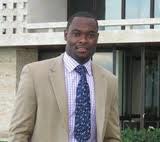 Darius Greene
Darius GreeneDarius Greene spent the first couple decades of his life in the South. After growing up in Alabama, he earned a degree in law and legal studies from Morris Brown, a historically Black college in Atlanta. But once he obtained a master’s degree in library science, he decided it would be best to continue his education away from the South. Since he had been nurturing a lifelong passion for the law, law school seemed like the logical next step.
He ended up at Massachusetts School of Law (MSL), where he enjoyed three years of legal knowledge, practical skills and camaraderie. Greene reminisces about how he didn’t know anyone when he arrived in Andover, Mass. But “by the time I graduated,” he says, “I had a slew of friends and keep in contact with many of them today.” He adds that MSL also gave him a more hands-on education than other law students might receive.
After graduating, Greene was offered a position as a diversity recruitment officer for MSL. Specifically, his job is to recruit talented individuals from historically Black colleges and universities and Hispanic-serving institutions. Now, he travels to states in the Mid-Atlantic and southeastern part of the country and speaks as a representative of MSL.
What makes MSL different from other schools? To start, they do not require that applicants submit scores from the Law School Admissions Test (LSAT). Their tuition is about 40 percent less than that of most other private law schools. They aim to be both affordable and accessible to all who want to attend law school. Specifically, MSL promotes their financial and admissions policies as a way to make law school a reality for “minorities, immigrants and members of the working class, all of whom have largely been excluded in the last 30 years, and to members of the middle class, who increasingly have been shut out in recent years,” Dean Lawrence Velvel said in a public message.
Greene, who has been working as a recruitment officer since 2008, recognizes that having a diverse student body adds to classroom discussion. He speaks about the rewards of his job and how it’s great to help “people pursue a dream they wouldn’t otherwise be able to pursue.” The minority students at MSL make up about 20-25 percent of the student population. Since Greene has been recruiting more at historically Black colleges and other institutions with a high number of minorities, this number has increased.
Several studies have indicated over the past few decades that standardized tests like the LSAT and the SAT have a racial or cultural bias. Some groups use this bias as an explanation for why underrepresented minorities tend to have significantly lower scores than Whites and Asians. Many colleges and universities no longer require the SAT. And MSL is one of a handful of schools that do not require the LSAT and offer a traditional education, rather than an online program.
According to a report by the Law School Admissions Council (LSAC), during the 2009-10 test season, Black test-takers had the lowest average score at 142.04. White students, on average, scored 10 points higher. Asians were on par with White students, and Hispanic students scored six points fewer than Whites and Asians. These kinds of numbers indicate to some that the test is not a strong judge of how well students will perform in law school.
As an example of how these numbers play out in admissions, for Rutgers School of Law in Newark, N.J., most students in the entering class of 2012 scored an average of 155. Stanford Law School displays a range of 160-180 on their admissions page. Most law schools are taking into account the individual experiences and qualitative accomplishments applicants bring to the table, but the LSAT is still strongly emphasized in the admissions process for most law schools.
Excluding an LSAT requirement does have some drawbacks, though. Because MSL does not require the LSAT, they are not accredited by the American Bar Association. As a result, graduates of MSL are only able to take the bar exam in 28 states. That said, Greene argues that graduates still receive a quality education. They are also able to pursue careers other than law, like politics or public policy.
Darius Greene looks to Thurgood Marshall as his hero and inspiration for pursuing a legal career. He refers to the late supreme court justice as a “gladiator for equal rights in this country,” especially during his time as a lawyer for the NAACP. Marshall inspired Greene to pursue his own dreams. And now he has the very rewarding task of letting minorities know that their dreams are also possible through institutions like Massachusetts School of Law.


















